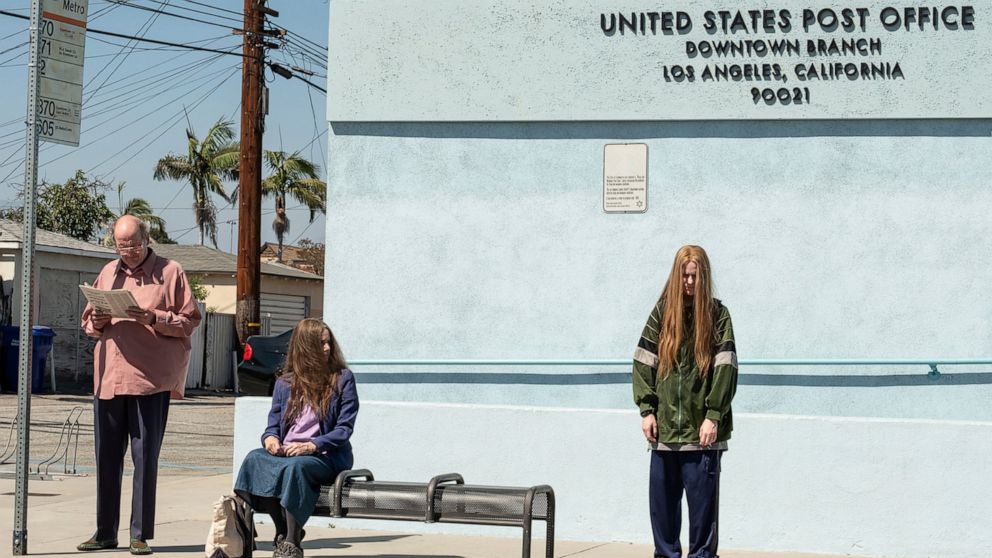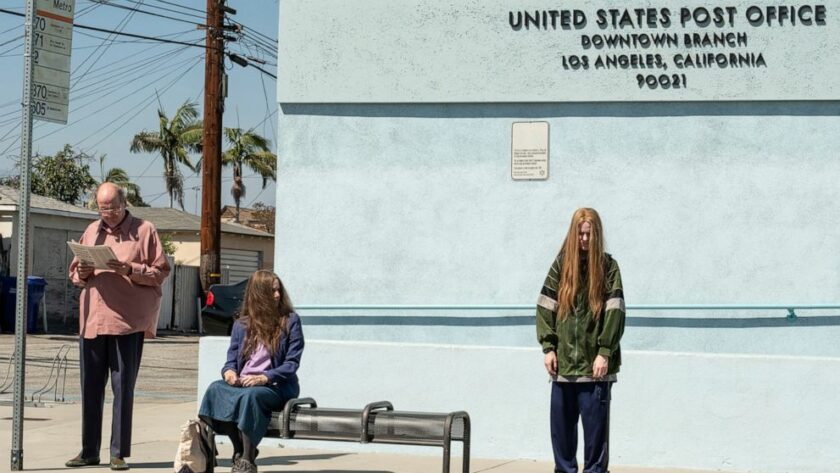BFI’s London Film Festival is in town! The FilmSoc Blog is back for the 64th edition of one of Europe’s largest film festivals, delivering a first look at the hits and misses of the 2020-21 season.
Lydia De Matos reviews Miranda July’s newest comedy-drama exploring a family of con-artists, currently showing at the London Film Festival.
A frequent feature of the definitely real, very prestigious canon of heist cinema is con-artists who, at least roughly, know what they’re doing. After all, watching George Clooney lead a group of attractive, fast-talking slickers through his elaborate plan to steal the world’s largest diamond from the personal safe of Mr. Rich Evilman is part of what makes the Ocean’s movies fun to watch.
This is not the case with Miranda July’s Kajillionaire. The central trio of grifters, the Dyne family: Robert (Richard Jenkins), Theresa (Debra Winger), and their twenty-six year old daughter, Old Dolio (Evan Rachel Wood), prefer to spend their time skimming what little they can. Their schemes, though convoluted, rarely yield much, and so the three are continually on the lookout for the next job. Robert and Theresa claim that they chose this lifestyle to avoid the fakery of the American Dream, so that they didn’t have to spend their lives chasing money. However, it seems that their determination to live as outsiders has caused them to create a distorted version of the capitalist structure they despise.
They have created for themselves an existence wherein every moment of the day, every ounce of their being and every resource they have goes towards scraping enough together to get by. Nothing can be done for enjoyment or simply for the sake of doing it, and everyone must be considered a target or a danger. Their family unit exists for this sole purpose: nothing more, nothing less; there is no room for sentimentality. It is only once Old Dolio attends a neighbour’s mandatory pre-natal in exchange for twenty dollars that she even considers the idea that affection should be an expected part of parenting.

With the film’s first act focusing so carefully on this strange family, it’s easy to assume that everyone in Kajillionaire’s world acts the way this trio does, especially considering the bizarre personalities of characters inhabiting July’s other features. Indeed, believing that her upbringing was normal is undoubtedly what stopped Old Dolio from ever demanding more from her parents than just ‘splitting everything three ways’. It’s only after the arrival of Gina Rodriguez’s refreshingly ordinary Melanie, that the audience and Old Dolio both are provided with a much needed reality check. Rodriguez’s casting is an unexpected stroke of genius; she almost seems to have been imported from an entirely different film. Her presence allows July to undercut the somewhat try-hard quirky tone that permeates the beginning of the film, in order to get to the darker side of the narrative. Suddenly, the narcissistic cruelty underlying Robert and Theresa’s behaviour towards their daughter is thrown into sharp relief; almost every oddity previously assumed to simply be July’s taste for the bizarre becomes a signifier of Old Dolio’s emotional trauma, and her parents’ neglect and manipulation.
There is a delightfully strange physicality to Evan Rachel Wood’s performance, almost Keatonesque in the way she masterfully expresses Old Dolio’s tumbling mess of emotions. Hiding beneath ill-fitting clothes and a mass of hair, she appears almost foreign to herself. Simultaneously we see her holding a deep-seated anguish, the cause of which she doesn’t understand, and a repressed warmth and desire for connection that she feels incapable of expressing. How does one go about beginning to learn how to forge real connections and unlearn destructive lies taught over decades? It is here that Kajillionaire finds its heart, in the slow process of self-reckoning and actualisation.
Were it not for Old Dolio’s age, it would be tempting to call this a coming-of-age story, and perhaps we still can. After all, aren’t those stories marked more by their shared thematic trajectory than the age of their protagonists? It could be noted that the teenagers populating these films are typically portrayed by actors in their twenties anyway. Old Dolio’s queerness plays a part in this too, her latent experience of the typical coming-of-age journey clearly recognisable to anyone who has struggled to come to terms with the ways they are different from their family, or whose home environment didn’t allow for self-expression beyond the expected.
Perhaps Kajillionaire is simply an honest acknowledgement of this, of the fact that despite what a slew of high school-set films might have you believe, not everyone experiences the same things at the same time. We all go through that terrifying process known as growing up in different ways, at different times.




